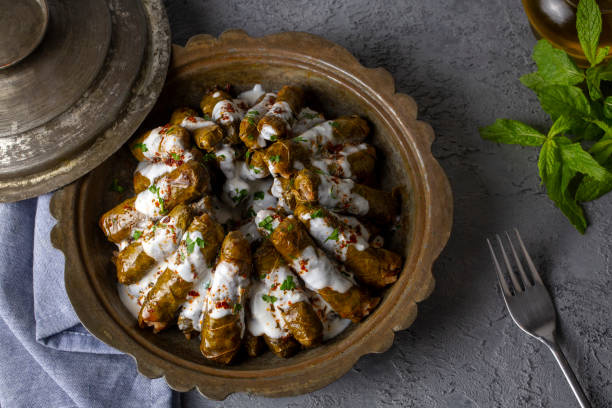Turkish cuisine has long been celebrated for its rich flavors, diverse ingredients, and deep cultural roots. With its unique position bridging Europe and Asia, Turkey boasts a culinary tradition that seamlessly blends the best of both worlds. For foodies, exploring Turkish gastronomy is nothing short of an adventure through history, culture, and an abundance of taste.
A Rich Culinary Heritage
At the heart of Turkish cuisine lies a deep respect for tradition. From the bustling streets of Istanbul to the serene villages of Anatolia, every corner of Turkey tells a story through its food. Dishes like kebabs, börek, and dolma have been perfected over centuries, reflecting influences from the Ottoman Empire, Central Asia, and the Mediterranean.
Stuffed Grape Leaves and Vegetables (Sarma and Dolma)
Sarma and Dolma are iconic dishes in Turkish cuisine, showcasing the art of stuffing grape leaves or vegetables with a flavorful filling.
- Sarma: The term “sarma” means “to wrap” in Turkish. It typically consists of grape leaves rolled around a mixture of rice, herbs, and spices. Variations may include pine nuts, currants, or minced meat. Sarma is often served cold as a meze or warm as a main dish.
- Dolma: The word “dolma” means “to stuff.” It refers to hollowed vegetables like peppers, zucchini, eggplants, or tomatoes, filled with a similar stuffing. Dolma can be vegetarian or include meat, depending on the recipe.
Both dishes are celebrated for their intricate preparation and are staples of Turkish feasts, family gatherings, and celebrations. They are a delicious representation of Turkey’s rich culinary heritage.
Must-Try Dishes for Foodies
Kebabs: Beyond the popular döner, Turkish kebabs come in various styles, such as Adana (spicy minced meat) and Urfa (milder flavors). Each region adds its twist to this iconic dish.
Mezes: These small plates, including hummus, muhammara, and cacık, are perfect for sharing and exploring diverse flavors.
Baklava: This world-famous dessert, with its layers of flaky pastry, pistachios, and sweet syrup, is a true testament to Turkish craftsmanship.
Menemen: A traditional Turkish breakfast dish made with eggs, tomatoes, peppers, and spices, showcasing the simplicity and richness of local ingredients.
The Modern Turkish Foodie Scene
In recent years, Turkish foodies have embraced a revival of traditional recipes, incorporating modern twists and presentation styles. Gastronomic hotspots like Istanbul now boast a range of contemporary restaurants that marry the old with the new. Food festivals, cooking workshops, and bustling food markets offer foodies a chance to dive deeper into the culinary culture.
Social media has also played a significant role in this evolution. Influential Turkish food bloggers and chefs now share their recipes and dining experiences with global audiences, making Turkish cuisine more accessible than ever.
Where to Start Your Turkish Foodie Journey
Visit Local Markets: Places like the Grand Bazaar and Spice Bazaar in Istanbul offer an authentic taste of Turkey’s diverse ingredients and flavors.
Explore Street Food: Try a simit (Turkish sesame bagel) or midye dolma (stuffed mussels) from local vendors.
Take a Cooking Class: Learn to prepare classic dishes from locals and take a piece of Turkey home with you.
For foodies, Turkey is a treasure trove of flavors and culinary experiences. Whether you’re indulging in a classic kebab or discovering innovative takes on traditional dishes, the Turkish food scene is an adventure worth savoring. With its timeless recipes, vibrant food culture, and passionate community of food lovers, Turkish cuisine continues to enchant foodies around the world.

